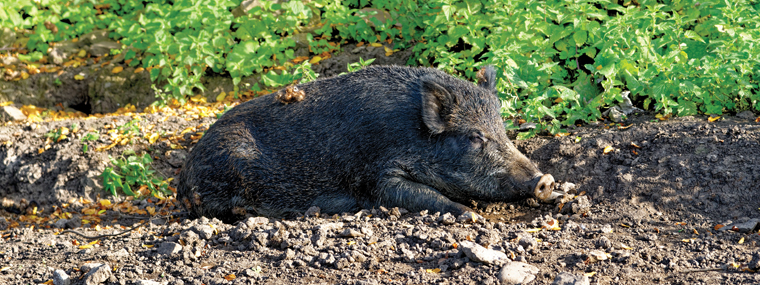
Wild Hog Invasion Requires Immediate Attention
By Laura Manning-Hudson / Publishing March 2021

Recent TV news reports of wild hogs invading several Florida communities in Manatee County reveal a serious problem that requires a considered and measured response.
The reports, which aired in recent newscasts in the Tampa Bay area by WFLA and WTSP, chronicle daily sightings and incidents of packs of wild pigs at the River Club community and surrounding neighborhoods.
Community resident Phil Pape says that in October and November the problem became seriously out of control. He and several of his neighbors tell the stations’ reporters that the wild pigs are wreaking tens of thousands of dollars in damage to their properties. The hogs tear up lawns and landscaping in search of food underneath the turf, replacing pristine lawns with a muddy mess.
“My neighbor next door, three-quarters of her property is all torn up,” states Pape, who notes that the hogs had been eating acorns in another neighbor’s property, and he’s seen packs of as many as 30.
Bob Lapp notes that he and other homeowners have been racking up damages around their homes, but they don’t want to fix everything until they know it won’t happen again. “The hard part is the fact that you could spend $1,000 today and wake up tomorrow morning, and it would happen all over again,” agrees Pape.
The River Club HOA has allowed trappers on site and set up traps, but homeowners such as Daryl Bernstein tell the stations the traps are not working and have not made a difference.
“I think it needs to be a bigger approach. River Club can’t do it by themselves, Lakewood Ranch can’t do it by themselves, Braden Woods can’t do it by themselves,” concludes Pape, who is probably correct in his assessment because the hogs obviously know no boundaries.
“I would like to see a big community approach to it,” he states. “Maybe even a small hunting season where people would be allowed to come in and thin the hogs.”
From the videos and photos from the stations’ reports and websites, the growing problem is indeed very severe. Based on the comments of the homeowners, it appears apparent that the invasion will continue to intensify unless measures are implemented to mediate it.
According to information and a helpful flyer from the website of the Florida Fish and Wildlife Conservation Commission, preventing wild hogs from invading property can be difficult, but adequate fencing should keep them out of small yards and gardens. On private property with written landowner permission, wild hogs may be trapped, shot, or hunted year-round with no fees, licenses, or permits required (including when using a gun and light during non-daylight hours). Hunters may use dogs and any legal rifle, shotgun, crossbow, bow, or pistol; hogs of either sex may be harvested, and there is no size or bag limit.
Poisoning wild hogs is prohibited, and trapped animals may only be released on a property with landowner permission. Prior authorization from the Commission is not required for individuals wishing to remove wild hogs from private lands with landowner permission, and private nuisance wildlife trappers offer services for their trapping, removal, and disposal. All traps must be checked at least once every 24 hours, and any captured non-target species must be released on site.
Given these relatively lax regulations, there is a great deal on the table for discussion among the boards of directors at the affected communities, which will need to work together to implement effective strategies for their entire area. They should begin by contacting the regional office for the Florida Fish and Wildlife Conservation Commission for their part of the state, which is the Southwest Region office located in Lakeland. The state agency may be able to provide for one of its wildlife officers to personally become involved to help the communities devise and implement the best possible solutions.
They should also contact several experienced local wildlife trappers for their insights and expertise.
If possible, these experts should be encouraged to participate in the meetings of the boards of directors for the affected communities, as their experience-based guidance should prove to be invaluable. All the voices from homeowners and other interested parties should be heard and considered, and the boards of directors should then make informed and reasonable decisions based upon all the expert advice and community considerations.
With destructive wildlife invasions such as this, hoping the problem will just go away without taking proactive measures is not an option for homeowners associations. By consulting with experienced wildlife professionals, working together with neighboring communities, and considering all the pertinent options and concerns, associations and their boards of directors can move quickly to address, curtail, and hopefully eliminate problematic and potentially dangerous wildlife invasions.
Laura M. Manning-Hudson
Partner, Siegfried Rivera
Partner Laura M. Manning-Hudson with the South Florida law firm of Siegfried Rivera has focused on representing condominium and homeowners associations in matters involving all aspects of community association law since 1998. She is based at the firm’s office in West Palm Beach and is a regular contributor to its community association law blog, www.FloridaHOALawyerBlog.com. The firm represents more than 800 community associations, and it also maintains offices in Miami-Dade and Broward counties. For more information, visit www.SiegfriedRivera.com or call (561) 296-5444.




